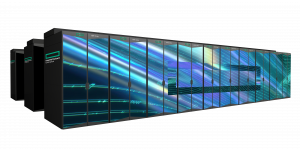Czechia will gain access to one of the fastest supercomputers in the world
By signing an agreement between the Ministry of Education, Youth and Sports (MEYS), the EuroHPC Joint Undertaking and the Finnish CSC – IT Centre for Science, the Czech Republic joined 9 European countries – Belgium, Denmark, Estonia, Finland, Iceland, Norway, Poland, Sweden and Switzerland – as a Member of the Large Unified Modern Infrastructure consortium to build a new supercomputer called LUMI in Europe. Following the signing of this agreement, the MEYS made instalment of financial contribution of EUR 1.6 million, which will give Czechia access to the LUMI supercomputer, one of the highest performance supercomputers in the world.
Hewlett Packard Enterprise, the vendor that won the contract to supply the main LUMI components, will take care of the construction of the supercomputer. On this occasion, a virtual press conference took place in Finland on 21st October 2020 to celebrate the signing of the contract.
The LUMI supercomputer will be installed in Kajaani, Finland, in mid-2021. LUMI is a leading pre-exascale supercomputer capable of performing more than 375 million billion calculations per second with a theoretical peak performance of up to 552 million calculations per second (552 PFlop/s). It will be one of the most energy-efficient supercomputers in the world, carbon neutral and using only renewable energy sources. The weight of the supercomputer will be approximately 150 tons and will cover an area of 150 m2, which is about the size of a tennis court.
The LUMI supercomputer is a unique joint investment of ten European countries and the EU, creating new research and business opportunities. With LUMI, researchers will be able to combat pandemics, develop drug components and study climate change. The LUMI supercomputer will position Europe as one of the global leaders in supercomputing.
LUMI’s total cost of ownership through 2026 is expected to be approximately EUR 200 million (CZK 5.5 billion), of which EUR 140 million will go to the supercomputer itself. These costs will be split between the EU – European Commission (EUR 100 million), Finland (EUR 50 million) and the remaining nine Members of the LUMI consortium (EUR 50 million). The acquisition costs of the supercomputer will be paid 50% by the Members of the LUMI consortium, including the Czech Republic. The remaining 50% will be paid by the European Commission through the EuroHPC Joint Undertaking, which will be the owner of the acquired supercomputer. The computing resources of the supercomputer will be divided into two halves, one half of which will be distributed among its participating states by the LUMI consortium according to the amount of their contributions. The other half of the computing resources will be allocated to users from the international user community by the EuroHPC Joint Undertaking.
Thanks to the EuroHPC initiative, other two pre-exascale supercomputers will be located in Spain and Italy in the coming years. Czechia will also operate its own petascale supercomputer within EuroHPC, which was built on the basis of the EuroHPC Joint Undertaking’s call to host petascale and pre-exascale supercomputers, announced in early 2019, and will be installed in the first quarter of next year in the premise of the IT4Innovations National Supercomputing Centre operated by the VŠB – Technical University of Ostrava. The new EURO_IT4I petascale system (EUR 14.86 million) will belong among 10 most powerful supercomputers in Europe and 50 most powerful in the world, with a theoretical peak performance of 15.2 PFlop/s.
The aim of the EuroHPC initiative, which includes a total of 32 European countries, with Czech Republic joining in 2018, is to build three pre-exascale supercomputers in Europe and, thus, jointly ensure the availability of the latest and most powerful High Performance Computing (HPC) technologies for EU Member States. The EuroHPC initiative aims to ensure the EU’s competitiveness and independence in the field of HPC, especially in comparison with Asia and the USA, which currently dominate the HPC field worldwide.
LUMI Supercomputer
